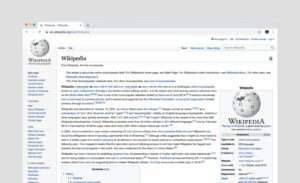Wikipedia is a remarkable online resource that has revolutionized the way we access and consume information. It is a free online encyclopedia that allows anyone with internet access to contribute and edit its articles. Since its inception in 2001, Wikipedia has grown to become the world’s largest reference website, attracting over a billion visitors each month.
Hosted by the Wikimedia Foundation, Wikipedia’s purpose is to benefit readers by providing information on a wide range of topics and branches of knowledge. Its articles are written collaboratively by a community of largely anonymous volunteers known as Wikipedians. These volunteers come from all walks of life and contribute their knowledge and expertise to create a comprehensive and reliable resource.
One of the key principles of Wikipedia is that what is written is more important than who writes it. The content on Wikipedia must conform to the platform’s policies, including being verifiable by published sources. This ensures that the information presented is accurate and reliable. Editors are encouraged to provide references and citations to support the information they add to articles.
Wikipedia’s software allows for easy reversal of errors, and experienced editors actively monitor and patrol the platform to ensure the quality of the content. This collaborative approach to editing and fact-checking sets Wikipedia apart from traditional printed references. Unlike printed encyclopedias, Wikipedia is continually updated, and articles on new events can appear within minutes rather than months or years.
One of the most remarkable aspects of Wikipedia is its inclusivity. Anyone with internet access can contribute to Wikipedia, regardless of their background or expertise. This open editing policy has allowed Wikipedia to become more comprehensive than any other encyclopedia. Its contributors enhance the quality and quantity of the articles, constantly refining and improving the information available.

However, with such an open editing policy, concerns about misinformation, errors, and vandalism arise. To address these concerns, Wikipedia has developed a set of policies and guidelines that editors are encouraged to follow. While familiarity with these policies is not a requirement for contributing, they provide a framework for maintaining the integrity and reliability of the content.
It’s important to note that Wikipedia is not without its limitations. As an open platform, it is susceptible to vandalism and deliberate misinformation. However, the dedicated community of editors and the platform’s software tools work diligently to identify and rectify such issues.
Wikipedia’s success can be attributed to its commitment to providing free and accessible knowledge to all. With over sixty-two million articles in more than 300 languages, including 6,776,752 articles in English alone, Wikipedia has become an invaluable resource for individuals seeking information on a wide range of topics.
In conclusion, Wikipedia is a remarkable platform that has revolutionized the way we access and contribute to knowledge. Its open editing policy, collaborative approach, and commitment to verifiability have made it the world’s largest reference website. While it is not without its limitations, Wikipedia continues to evolve and improve, thanks to the dedicated efforts of its community of volunteers.























